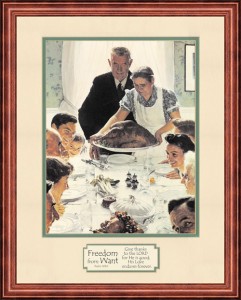Last Thanksgiving we did what many American families do as they sit down to their annual feast. We went around the table, and each person gave a sentence of thanks for something or someone important to them. But we put a caveat on it: “You can’t make a generic statement that you’re thankful for faith or family, because we’re all thankful for those.”
That made it more interesting.
Reasons for thankfulness were imaginative and meaningful. One of Mary’s twin granddaughters, almost 9, said, “I’m thankful for all the former presidents of our country that were Christians.” Priceless. Speakers revealed something about themselves as well as the person they mentioned. All 28 guests participated, and we plan to repeat the exercise this year.
Some people find it easy to have a steady attitude of gratitude as they pace through life. Others find it more difficult and have to work at doing so. Whether it comes naturally or is forced, we all benefit from words of thanks.
Why is it that so many of us think complaining will make us feel better, when God has set up our internal barometers to work just the opposite? Maybe it’s because complaining is easier. It’s interesting that voicing thanks rather than being negative not only encourages listeners but lifts our own spirits, too. Knowing that, we ought to do much more of it.
All of us gravitate toward people who are grateful. They’re a pleasure to be around, and we find that hanging with them draws out the best in us, too. It’s been said, “Gratitude is a vaccine, an antitoxin, and an antiseptic.” Although that isn’t in Scripture, it could easily fit into Proverbs.
God, the great Bestower of endless blessings, has instructed us to be enthusiastically thankful, and not just when we feel like it. He knows how life’s troubles can dampen our gratitude, but he insists we’re to be thankful anyway. He spells it out in 1 Thessalonians 5:18. “Give thanks in all circumstances; for this is God’s will for you in Christ Jesus.”
Really? Even when accidents occur? Or cancer invades a family? Or death takes a loved one?
Yes.
In all circumstances, even those we don’t understand at the time. And if nothing around us seems thank-worthy, we can thank God for himself, because he is always thank-worthy.
“Enter his gates with thanksgiving and his courts with praise; give thanks to him and praise his name. For the Lord is good and his love endures forever; his faithfulness continues through all generations.” (Psalm 100:4-5)





